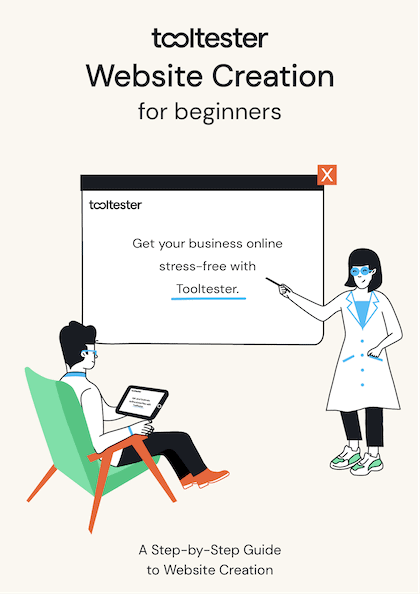Tooltester is supported by readers like yourself. We may earn an affiliate commission when you purchase through our links, which enables us to offer our research for free.
In an episode of The Daily Stoic podcast, American author Steven Pressfield (famous for The War of Art and The Legend of Bagger Vance) discussed how marketing is one-half of a modern writer’s job – especially when you’re self-publishing.
In order to spread the word about your work, social media is obviously an important road to explore and a good way to find readers. But if you really want them to see you as a professional writer, you need to dive in headlong and create your author website.
With so many competitors out there, you can’t let marketing opportunities pass you by, or entrust your publisher or literary agent (if you have one) to do all the work.
When you first start out, this can be overwhelming. The majority of website builders will leave you scratching your head, making you wish you studied web development rather than journalism.
Don’t worry–we’ve analyzed 8 site builders that can help you establish a solid online presence and build a loyal following. Some can even help you sell your physical and digital products such as e-books directly on your homepage. Read on to find out the best website builder for authors based on your needs.
What to look for in a website builder for authors
Your website builder provides the backbone for your author’s website. To make your website exceptional and impress any magazine, publishing house or curious reader, your builder should offer author-friendly tools and features, such as:
- Ease of use: As a literary genius, no one expects you to use coding skills to create a website. Fortunately, the best website builders for authors often come with drag-and-drop functionality and user-friendly interfaces. It’s just a matter of choosing the one you can handle better.
- Portfolio/gallery features: Your online corner is your chance to showcase your credentials and past projects. As an author, chances are you also offer writing and editing services, or teach some courses. The right website builder for authors enables you to design your portfolio page and highlight key information about your work skills and projects.
- Blog: A section for sharing thoughts, samples of your books and recent updates will help establish credibility and build relationships with your audience. Therefore, choosing a website builder with robust blogging functionality makes sense for writers, whether aspiring or established.
- Contact form: Contact forms make it easy for visitors to contact you with questions or to schedule a book signing. The right website builder for authors should enable you to design optimized forms with the appropriate fields and style.
- Social media links: Your social media links allow visitors to view your content across multiple platforms. Website builders with social media integrations are easy to come by, but the right one can give you the functionality you need, such as gallery previews, follow us buttons, and sharing options.
- Newsletter sign-up form: Visitors can sign up for the author’s newsletter to keep up with the latest news and get to know your writing style. This pairs well with your blog and serves as a marketing machine. It enables you to update subscribers whenever new content or book rolls out. Like your contact form, your website builder should make the form easy to design and integrate.
- Search engine optimization (SEO): Improving a website’s ranking in search engines can attract website visitors to your author page. Some website builders for authors have built-in SEO tools that make it easy to achieve a strong online presence without being an SEO whiz.
- Built-in e-commerce solution: The best website builders for authors who want to sell books and online courses should have built-in e-commerce capabilities. It will help kick things off.
- Affordability: The best website builders for authors lets you build a site without breaking the bank and sacrificing quality. Some offer free versions, while others have tiered pricing.
The 8 best website builders for authors to check out
With the above considerations in mind, we’ve put together 8 of the best website builders that should be on your radar:
Read on to learn more about how each one helps authors launch an online presence and connect with their readers.
Squarespace
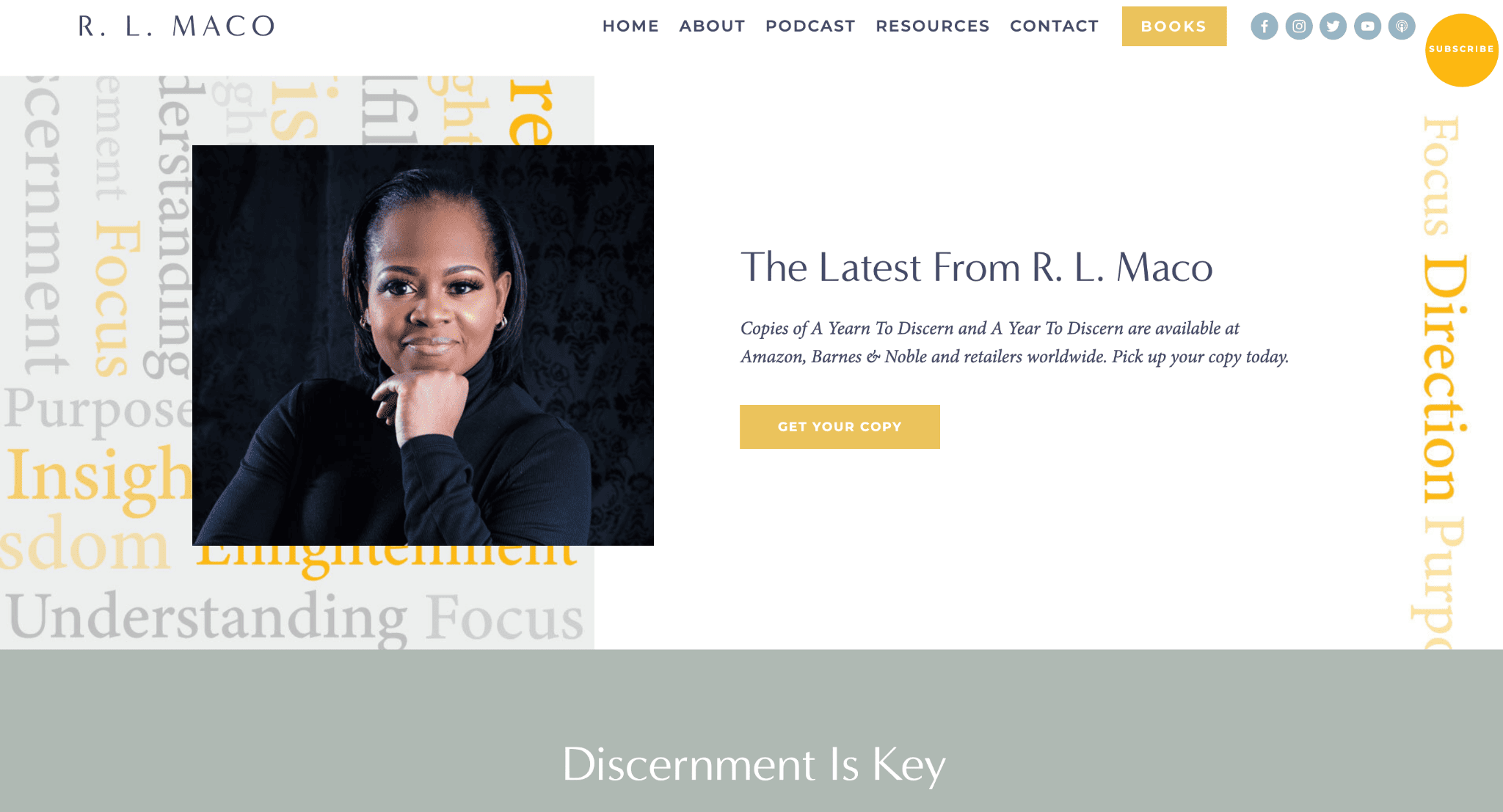
Squarespace author website example: Yearn To Discern
A quick glance at A Yearn To Discern writer R.L. Maco’s Squarespace author website reveals the platform’s distinctive sleek, modern aesthetic.
Squarespace is brimming with stunning templates creatives of any kind will give the nod to–that’s why it’s one of our favorites at Tooltester. As a writer, this gives assurance that your author site won’t drown in the sea of well-designed sites.
Here are some gorgeous themes to check out:

Squarespace has over 150 captivating themes. Simplify your search by starting with the portfolio templates.
Aside from the design aspect, Squarespace has plenty of author-friendly features up its sleeves–starting with blogging, which is one of Squarespace’s biggest draws. We even dubbed it a worthy WordPress blog alternative.
Some of its blogging features include commenting, multi-authoring, post scheduling, and geolocation tags. You can also create posts from your phone and host your podcast on the platform.
Squarespace also offers strong e-commerce capabilities for your books, editing services, and more. With Squarespace Membership areas, you can even offer members-only blog content. And Squarespace Courses lets you offer online writing courses with free, one-time, or subscription pricing options.
With all these revenue-generating offerings in one convenient location, it would be a shame if no one saw your website.
Luckily, Squarespace ensures that your marketing needs are covered. With its built-in SEO tools, you can easily reach a wider audience. Send your subscribers customized email marketing campaigns. Or craft brand-consistent social media posts using proprietary apps, such as Unfold and Studio Video App.
If that isn’t enough, you can head over to Squarespace Extensions to add third-party sales and marketing integrations:
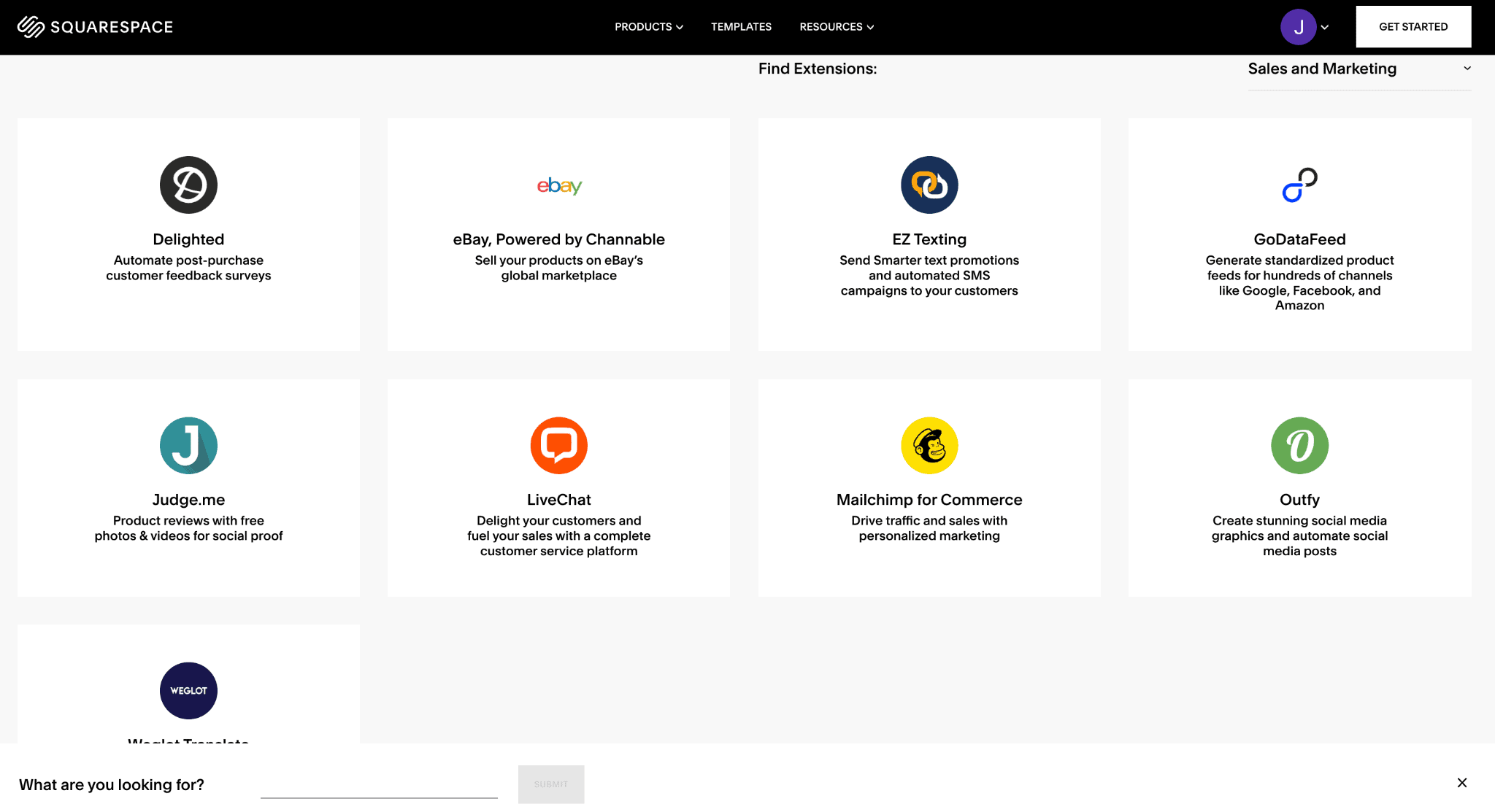
Aside from sales and marketing apps, Squarespace has apps for these categories: shipping and fulfillment, finance, and inventory and products.
Of course, some authors may not find these integrations sufficient for expanding their website’s capabilities. If it’s the case for you, consider other website builders that offer more apps. (We’ve got you covered. Keep reading to discover which ones made it to our list.)
Pros
- A great collection of creative portfolio templates
- Extensive marketing, blogging, and ecommerce features
- Squarespace Members Areas offer exclusive content for sale
Cons
- No free trial available
- Expensive monthly fees
- Useful integrations, but limited options
- Many features (e.g. member areas, online courses) require a paid add-on
- No integrations with print-on-demand services for books
Squarespace’s Pricing Plan
- Personal: 11€/month
- Business: 17€/month
- Online Store (Basic): 24€/month
- Online Store (Advanced): 36€/month
Learn more about Squarespace’s plans and pick one that fits your budget.
Best suited for: Authors exploring different types of content and product offerings. Squarespace can host your podcast, and let you sell physical and digital goods (including gated content).
More information on Squarespace
Check out our full review of Squarespace here.
Or get your free 14-day Squarespace trial started now.
Wix
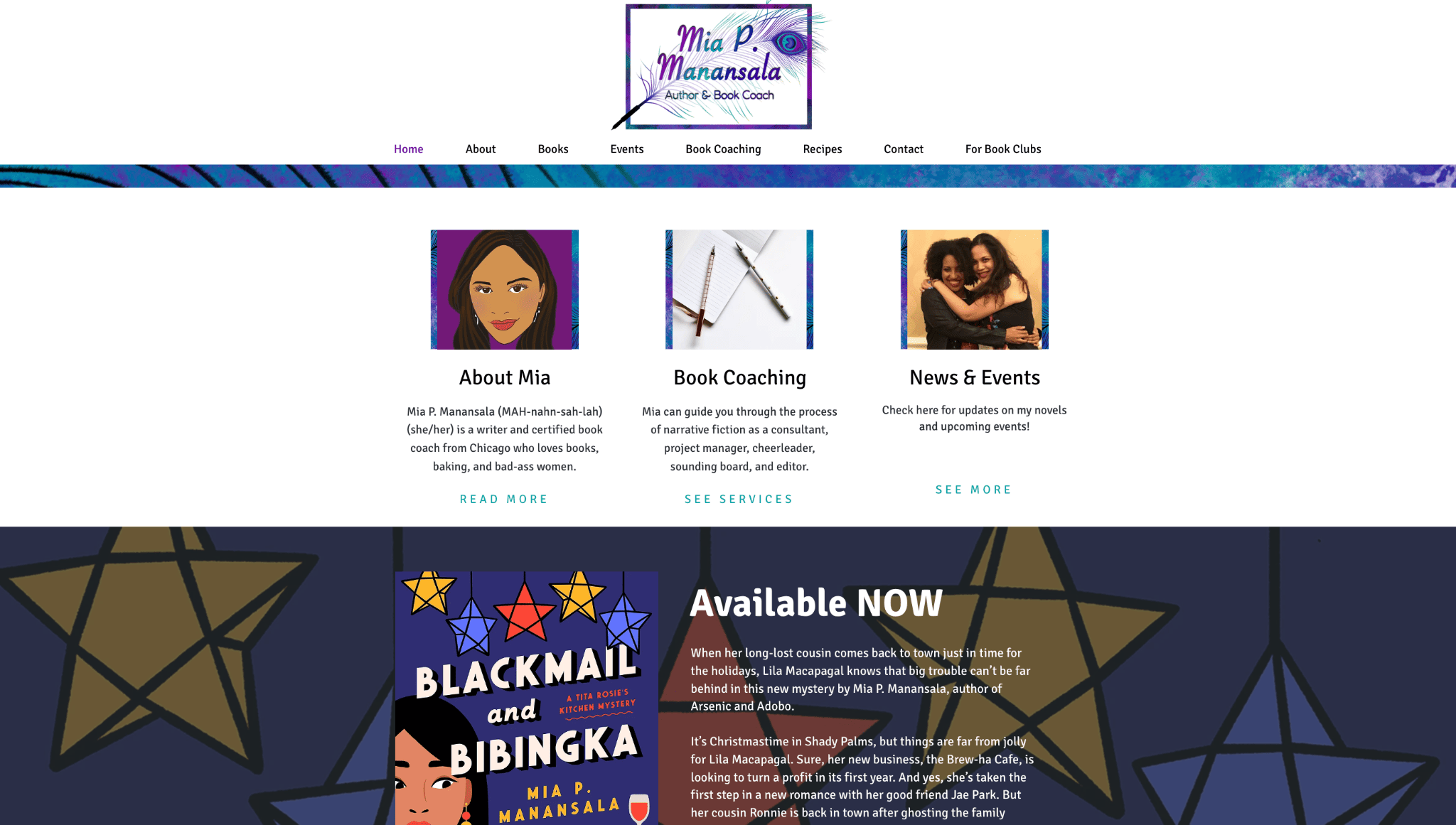
Wix author website example: Mia P. Manansala
Wix is the website builder world’s all-around jack. But unlike the typical generalist, it offers much more than a decent set of features, letting you build a website for just about any purpose – whether that’s promoting yourself, your work, events, or a new book launch:
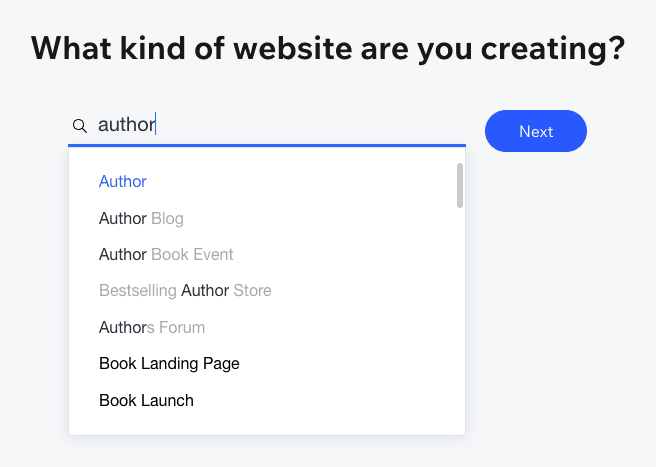
For starters, Wix’s theme library is home to over 800 designer-made templates. Under the Literary Arts category, you’ll find 19 (see this template in action on author Allan Allinger’s website):
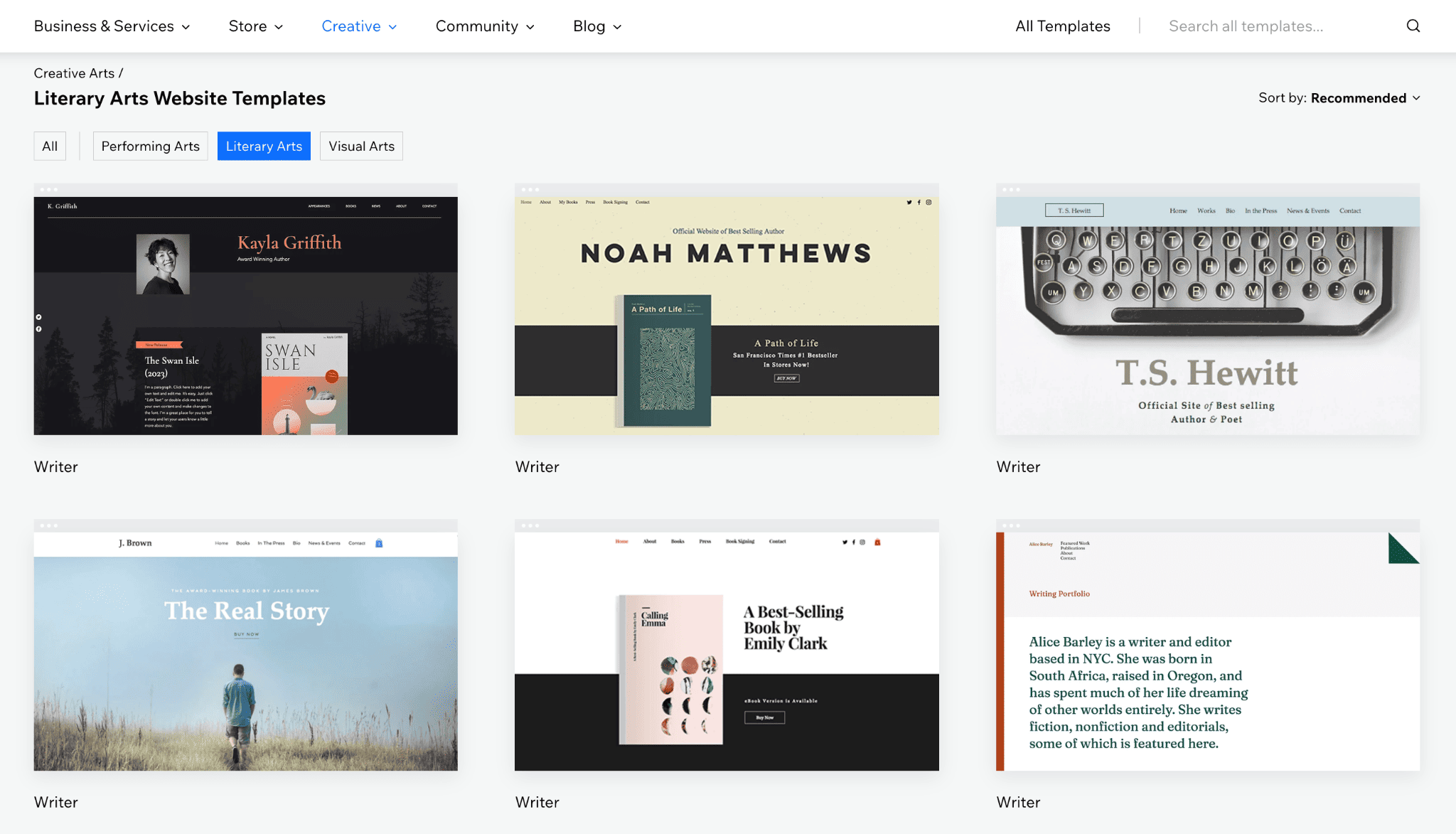
Wix’s templates
Customizing your chosen template is quick and easy. Wix allows code-free setup. Its cutting-edge drag-and-drop editor lets you get down and tweak the brass tacks to achieve a more personal aesthetic–from fonts to layouts to social icons. Trust us: your book covers will be beautifully displayed.
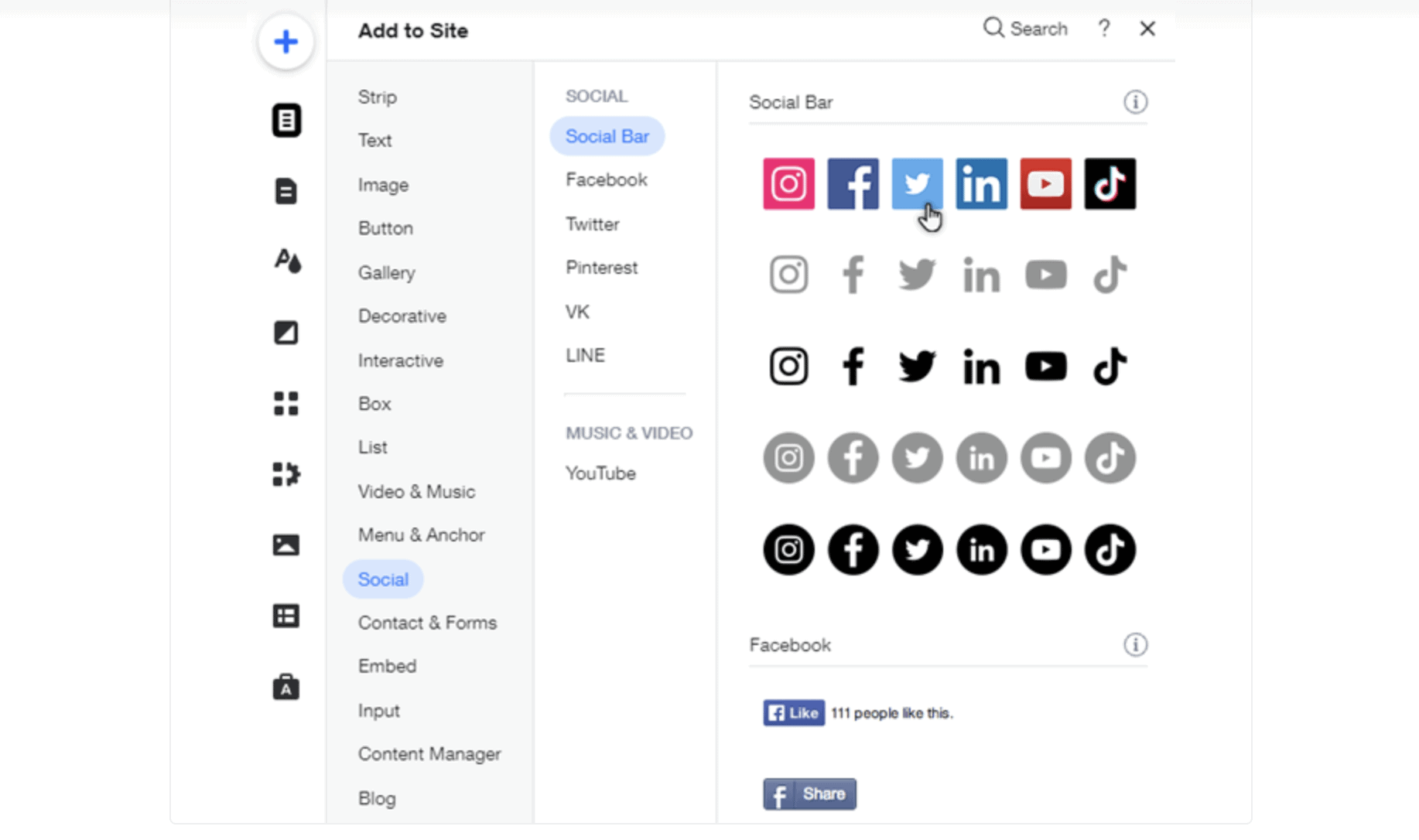
Adding a social bar to a Wix site
Alternatively, if you want a faster solution, Wix ADI (Wix’s AI-powered website builder) can create a professional website for you in a matter of minutes.
Wix also provides a range of intuitive tools for authors. Its blogging platform isn’t as sophisticated as Squarespace’s. But there’s little difficulty in setting up a blog with it. And if you hit a wall, the site builder has courses to help you get past it.
With Wix, you can create different forms, including subscription forms, e-signature forms, and payment forms. Wix SEO Wiz also ensures your website is optimized according to your needs, regardless of your SEO expertise. Follow the tips, and you’re good to go.
In terms of ecommerce, Wix offers one of the most comprehensive solutions you’ll find in a website builder. You can sell physical or digital books, services, subscriptions, memberships, and even event tickets straight from your website. It’s also possible to connect your store to multiple sales channels, including Facebook, Instagram, and Amazon.com. Plus, if you’re selling your books at pop-up events, you can take advantage of its point-of-sale features and accept contactless payments, just with your iPhone. Read more in our complete Wix Ecommerce review.
Best of all, it’s got a rich app market that you can scour to increase your website’s functionality and power up your campaigns. Categories include marketing, analytics, online selling, design, and communication. It also offers its own apps, such as the Wix Audio Player, which lets you sell audiobook tracks.
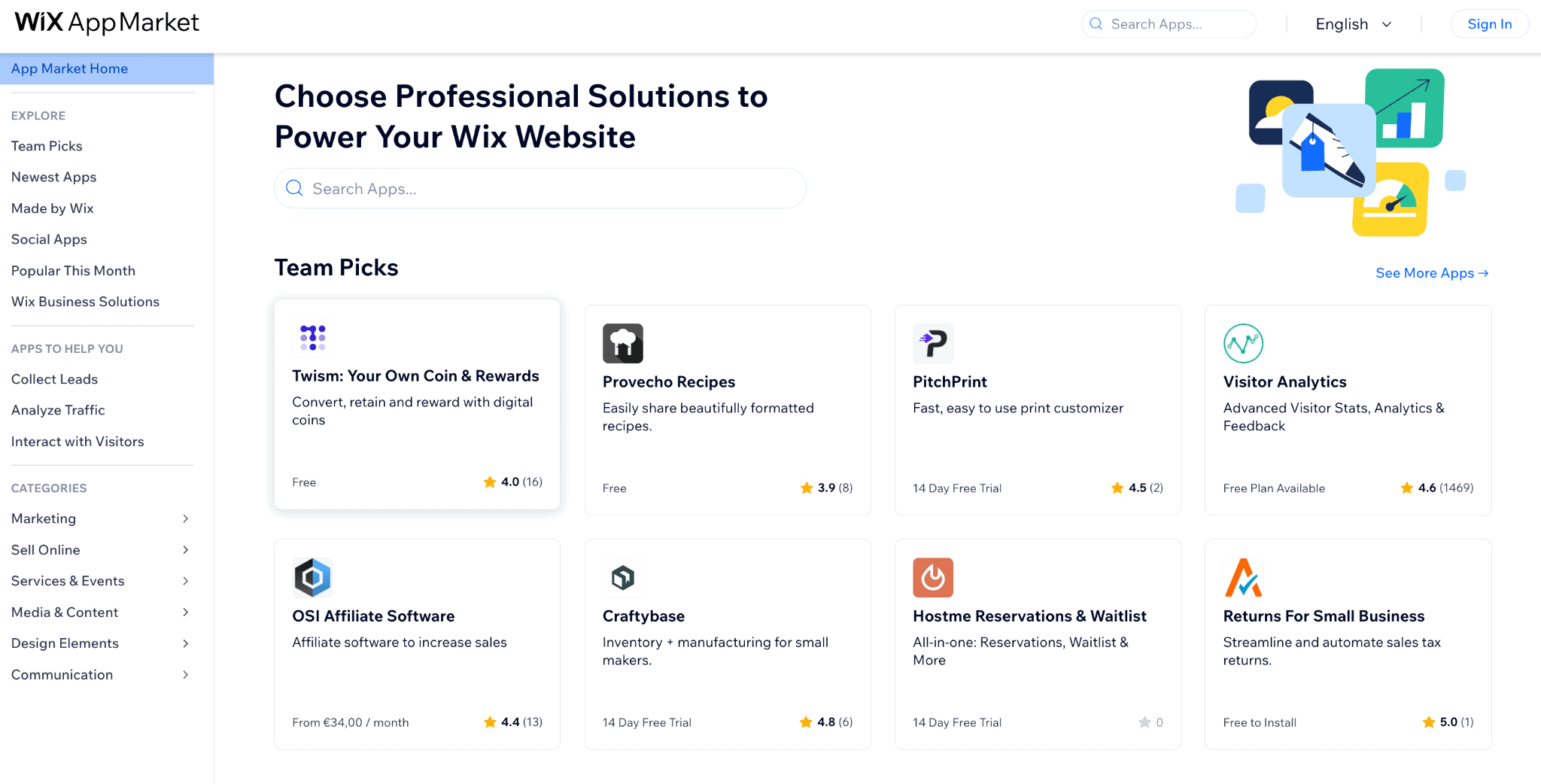
Wix’s range of apps integrations is abundant. Choose from a huge range of third-party apps or even Wix’s own apps
However, Wix’s major disadvantage is the design lock-in. Once you choose a template, you can’t just switch it up. It’ll have to be done from scratch. We also found that Wix’s page loading speeds can be slower than other website builders, which could impact not only the experience of your readers, but also your rankings in Google.
Pros
- Impressive SEO tools, suitable for newbies
- Intuitive drag-and-drop builder
- Solid ecommerce features
- Abundant third-party apps to power up your author website
- Supports multilingual sites
Cons
- Paid plans have a steep price tag
- Design lock-in – you’re not able to switch templates once you’ve chosen one, and it takes a lot of work to overhaul a design completely
- Website loading speeds can be on the slow side
- While Wix integrates with a number of print-on-demand services (and even offers its own), these unfortunately don’t support the printing of books
Wix’s Pricing Plan
- Free: €0
- Light: €199/month
- Core: €22/month
- Business: €34/month
- Business Elite: €149/month
Wix covers a lot of ground, even with its free plan. But if you’re planning to sell your work online, you need an ecommerce plan. Check out Wix’s pricing plans to find the right package for your author website needs.
Best suited for: Authors interested in having a professional-looking website without having to manage it regularly. If you don’t intend to put out regular blog content, you won’t get bogged down by Wix’s average blogging functionality.
More information on Wix
Discover everything you need to know about Wix in our comprehensive review.
Or take a look at Wix’s capabilities for yourself.
WordPress.com
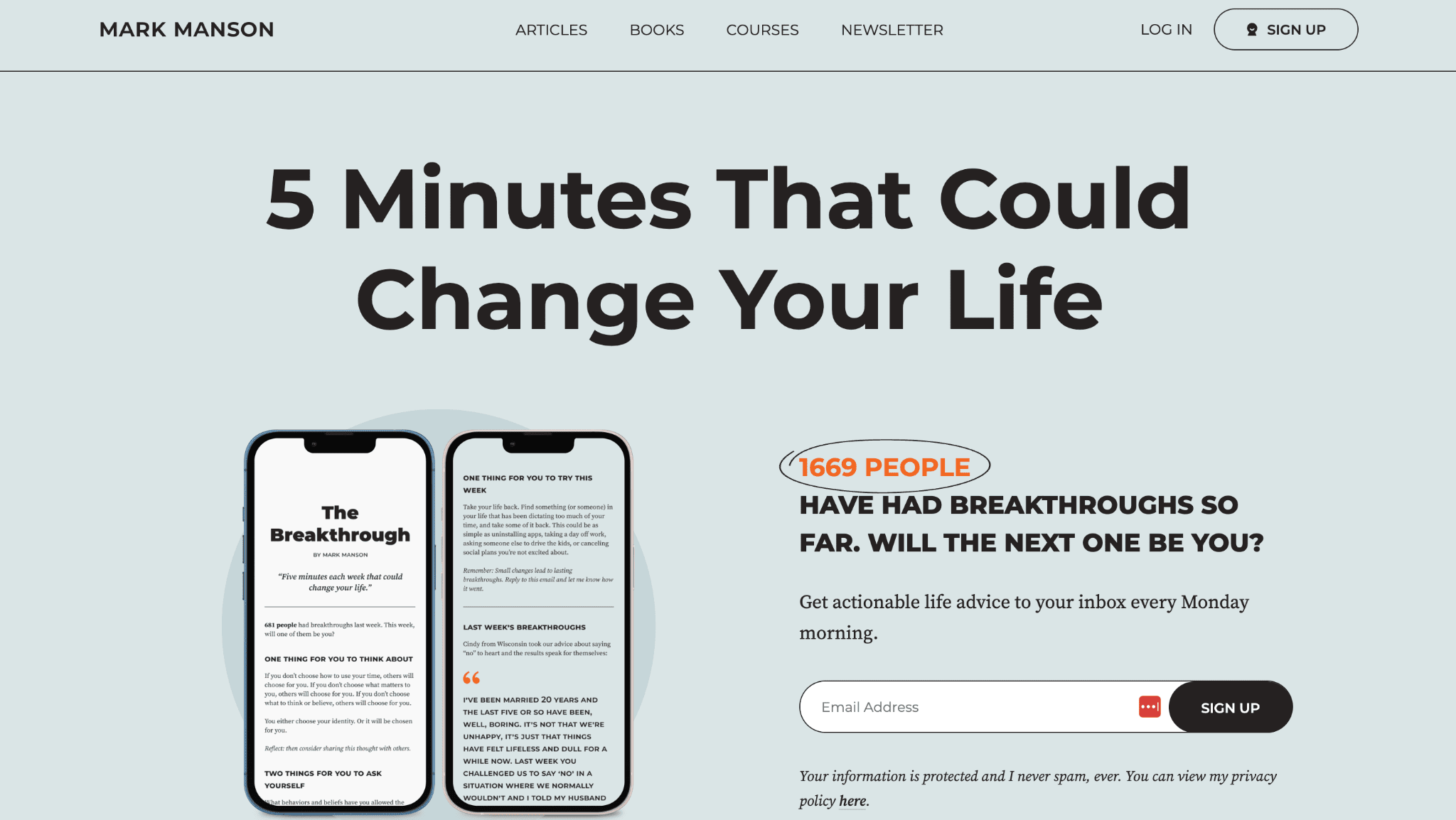
WordPress author website example: Mark Manson
While drag-and-drop website builders are every newbie’s favorite, nothing beats WordPress in terms of flexibility and customization.
And it seems like many world-renowned, award-winning wordsmiths agree. Aside from Mark Manson, other patrons of the platform include Steven Pressfield, Ta-Nehisi Coates, Kristin Neff, James Clear, Colleen Hoover, and Malcolm Gladwell. Phew, quite a few industry titans there.
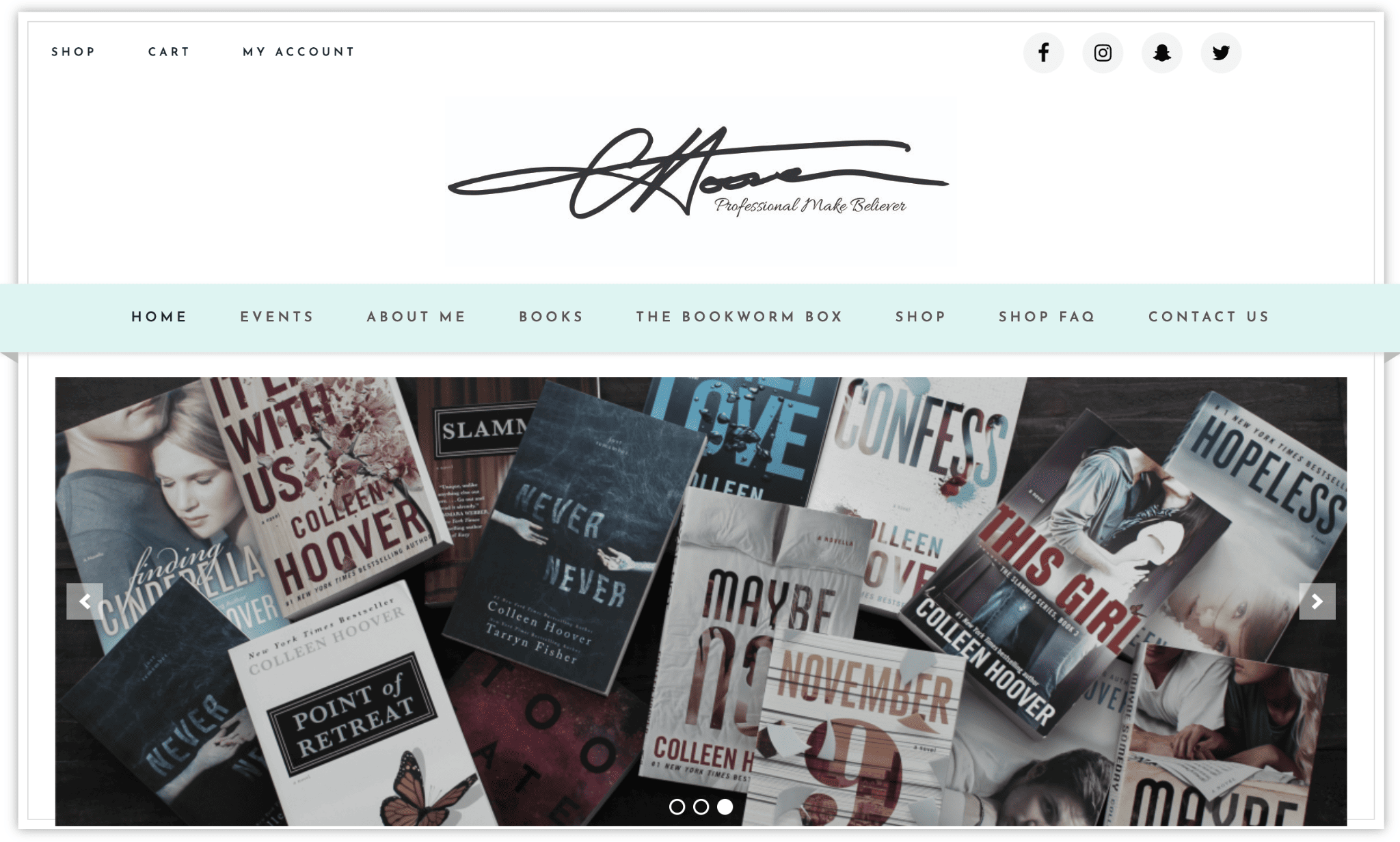
YA Writer Colleen Hoover’s website
WordPress started out as a blogging platform but has since evolved into two services: the hosted WordPress.com service, and the standalone WordPress.org platform. (Note: This piece will focus more on the former, since it’s a more suitable offering for time-pressed authors.)
Despite the change in direction, it has retained its superb blogging functionality. So if you’re planning to put out content regularly, it makes sense to build your author website using WordPress.
There’s also the added bonus of being able to sell products easily with the popular WooCommerce plugin, which adds an online store to your site. This enables you to access print-on-demand book services like Lulu Direct and Acutrack, which will print and ship your books on your behalf. We’ve yet to come across any other website builder that offers this kind of integration!
From a design standpoint, authors can choose from WordPress.com’s free and premium or customizable templates. But to access the more exclusive themes, a higher-tiered plan is required.
Now, what makes WordPress one of the more hands-on website builders is that it has a less user-friendly editing interface. It takes some time to learn all of its advanced features, so be prepared to pull up your sleeves and get to work.
There’s a workaround, though. If you’re willing to shell out a little extra, integrating third-party page builder apps, such as Elementor and SeedProd, can turn your backend into a drag-and-drop interface.
This is a fairly common solution on WordPress. Think of whatever capability – ecommerce, design, community building – you want your author website to have. We bet you’ll easily find a plug-in that can do the job.

WordPress boasts over 60, 000 third-party integrations.
Pros
- Free and economical plans
- Over 60,000 integrations to add extra features to your site (members areas, reader reviews etc)
- Excellent blogging platform
- Highly customized website
- Best platform for multilingual sites
- Sell products easily via WooCommerce (and get access to print-on-demand services)
Cons
- Time-intensive and demanding website design
- Consistent and complex website maintenance (hello, updates!)
WordPress.com’s Pricing Plan:
- Free plan available
- Premium: 8€/month
- Business: 25€/month
- eCommerce: 45€/month
All plans come with hosting, a free domain for one year, payment collection, and unlimited email support. You can read about WordPress.com’s pricing plan in detail here.
Best suited for: Authors that can hire a team and want a great blog. This way, they won’t get frustrated by website set-up and maintenance. Based on what we’ve seen, notable writers deem WordPress the best website builder for authors.
More information on WordPress
Read our WordPress.com review or check out how it differs from WordPress.org.
Or get started today with WordPress.com.
Hostinger Website Builder
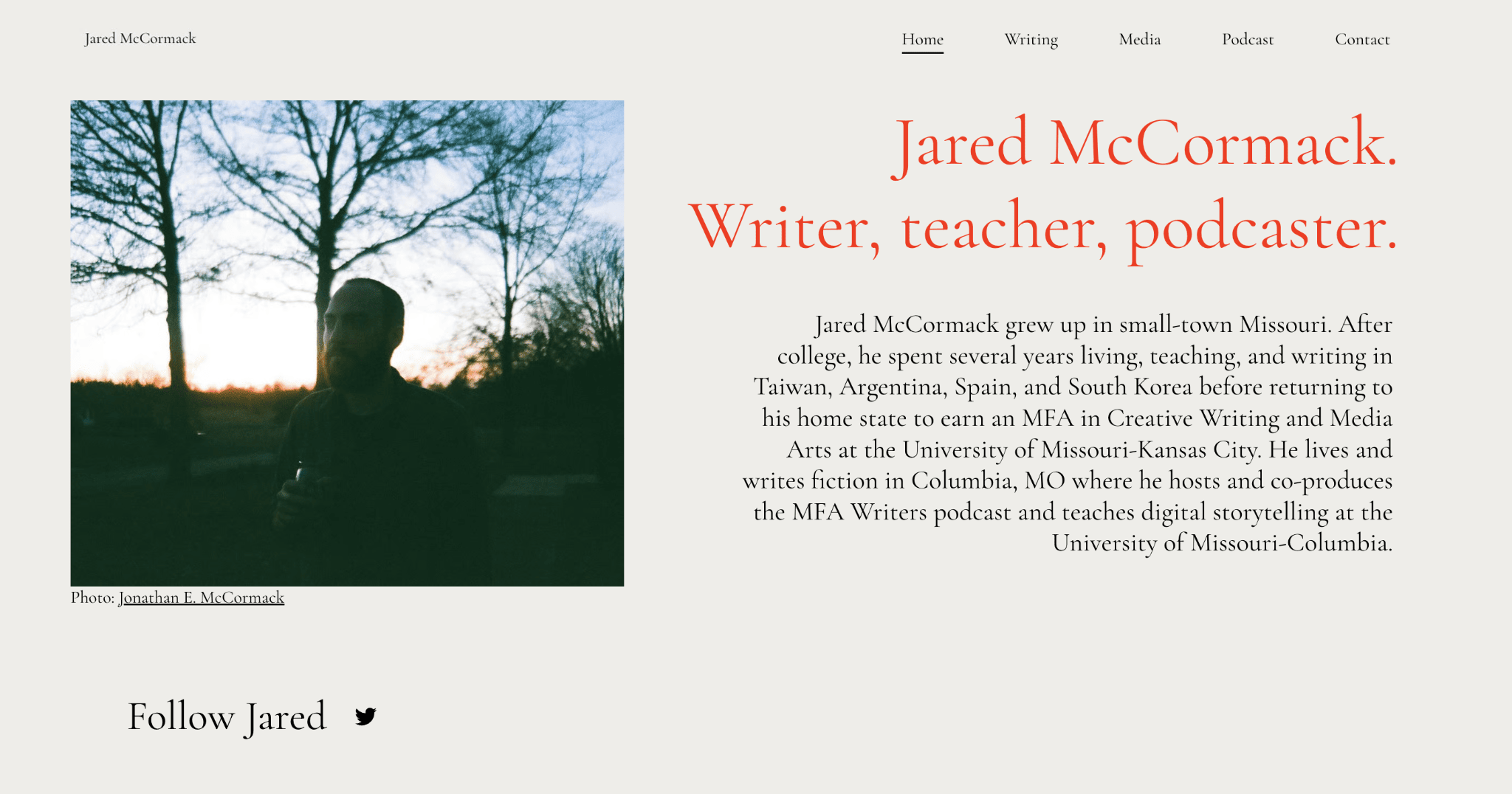
Hostinger Website Builder example: Jared McCormack
Hostinger Website Builder (formerly Zyro) is perfect for newbie authors getting their feet wet at having an online presence. Like Squarespace and Wix, Hostinger Website Builder is easy to use as it offers responsive templates, albeit simpler ones, and an intuitive drag-and-drop editor.
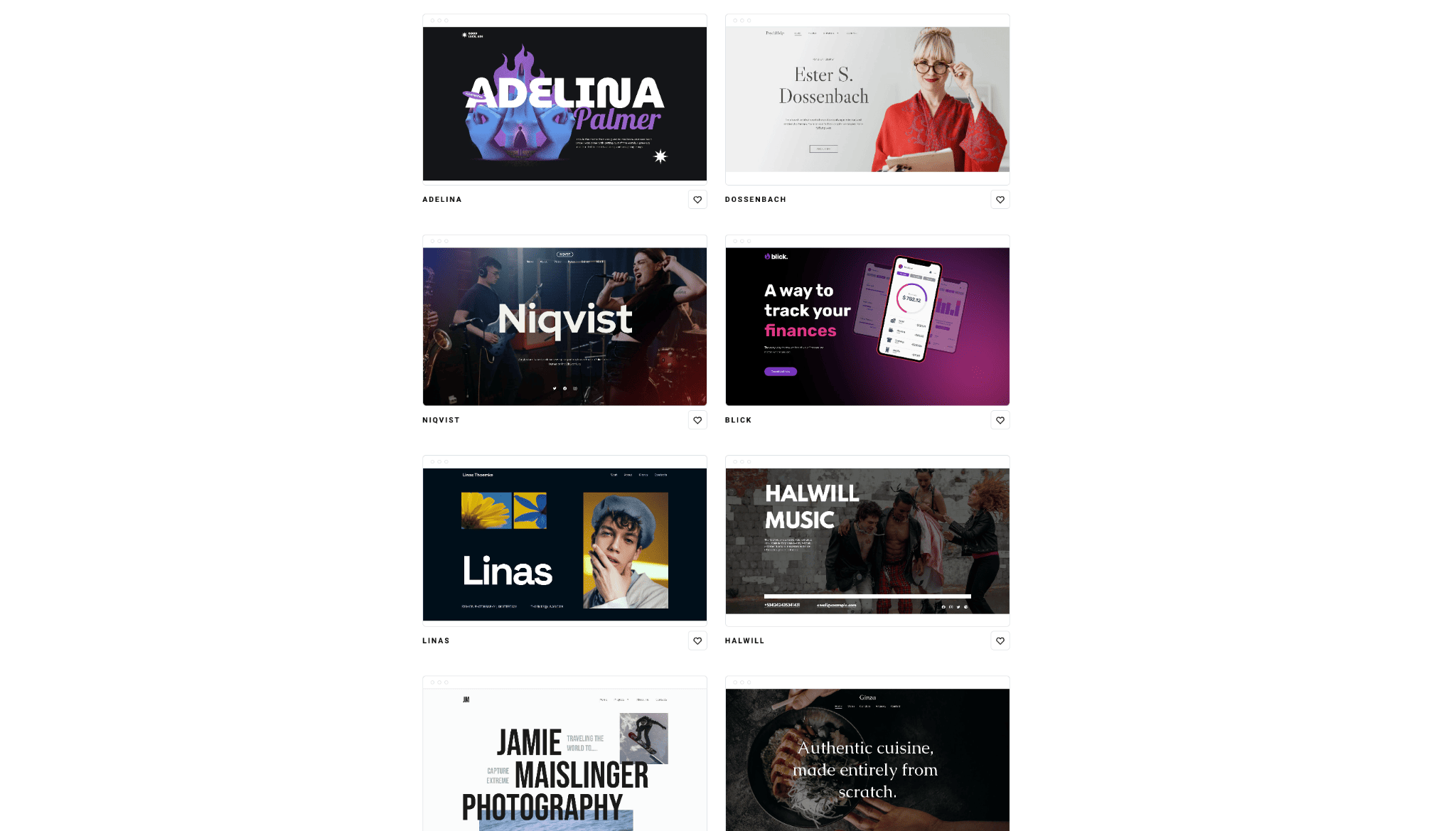
Hostinger’s templates lack Wix’s or Squarespace’s polish, but they’re neat and professional.
Its editor and website design process are very similar to Wix, allowing you to design your website or start from scratch
Writers acknowledging AI as an ally, not a foe, can save time using Hostinger Website Builder’s impressive toolkit. From blog ideas generator to title generator to content builder, it’s the perfect place to find a jumping-off point for new projects or to pick something to write about. There’s also a logo generator and slogan generator to help beginners with their branding.
That said, its blogging features aren’t sophisticated yet. If you want to have an author website mostly to showcase your work and blogging is not a priority, it should be good enough. The blog editor offers the same drag-and-drop customizability. At the same time, integrations are pretty limited. To date, Hostinger Website Builder still doesn’t have an app market.
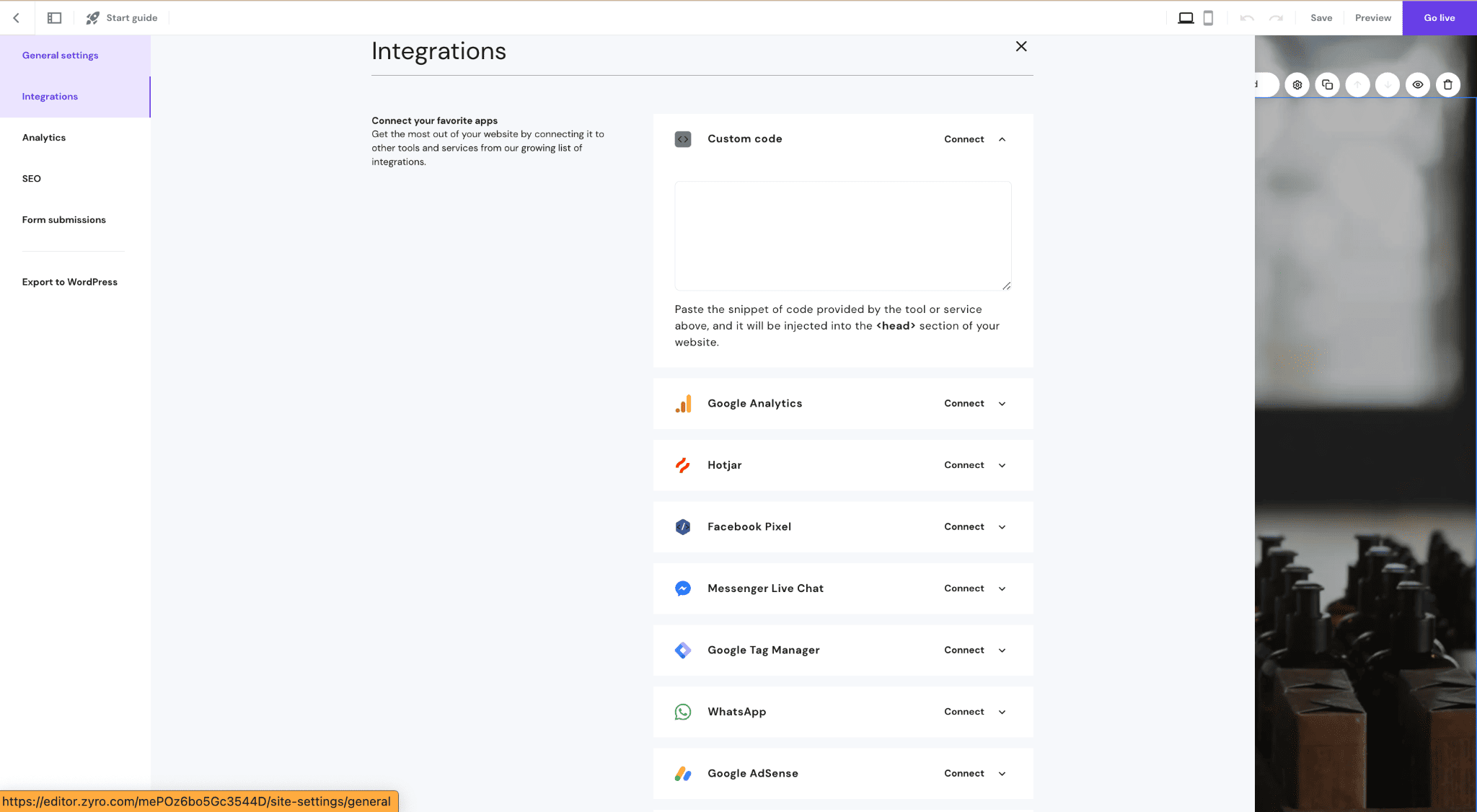
Hostinger Website Builder currently has 7 built-in marketing integrations and custom-coding capabilities.
On the upside, the platform’s ecommerce features and SEO tools are decent. Hostinger Website Builder supports the sale of physical, digital, and service products (plus donation acceptance – which can be a nice way of getting financial support from your audience).
With SEO, you can change the title, the meta description, the URL, and the alt text of a page. It also enables you to switch and optimize for different languages, making it suitable for a broader audience.
Pros
- Affordable plans
- Essential ecommerce and SEO tools
- AI tools that can stimulate writers’ creativity or strengthen their personal brand
- Supports multilingual sites
Cons
- Weak blogging capabilities
- Limited templates
- Limited integrations and plug-ins
- Can’t try out for free
Hostinger Website Builder’s Pricing Plan:
- Website: 7,99€/month for yearly subscription
Includes free domain in the first year. Despite the lack of a free plan, Hostinger Website Builder offers a 30-day money-back guarantee.
Best suited for: Newbie authors establishing their name online. It also works for established authors who only need a website to sell their books and digital products.
More information on Hostinger Website Builder
Here are our thoughts on Hostinger Website Builder and its potential.
Or try Hostinger Website Builder today and discover its capabilities. (Use the link to get three months free.)
Convertkit
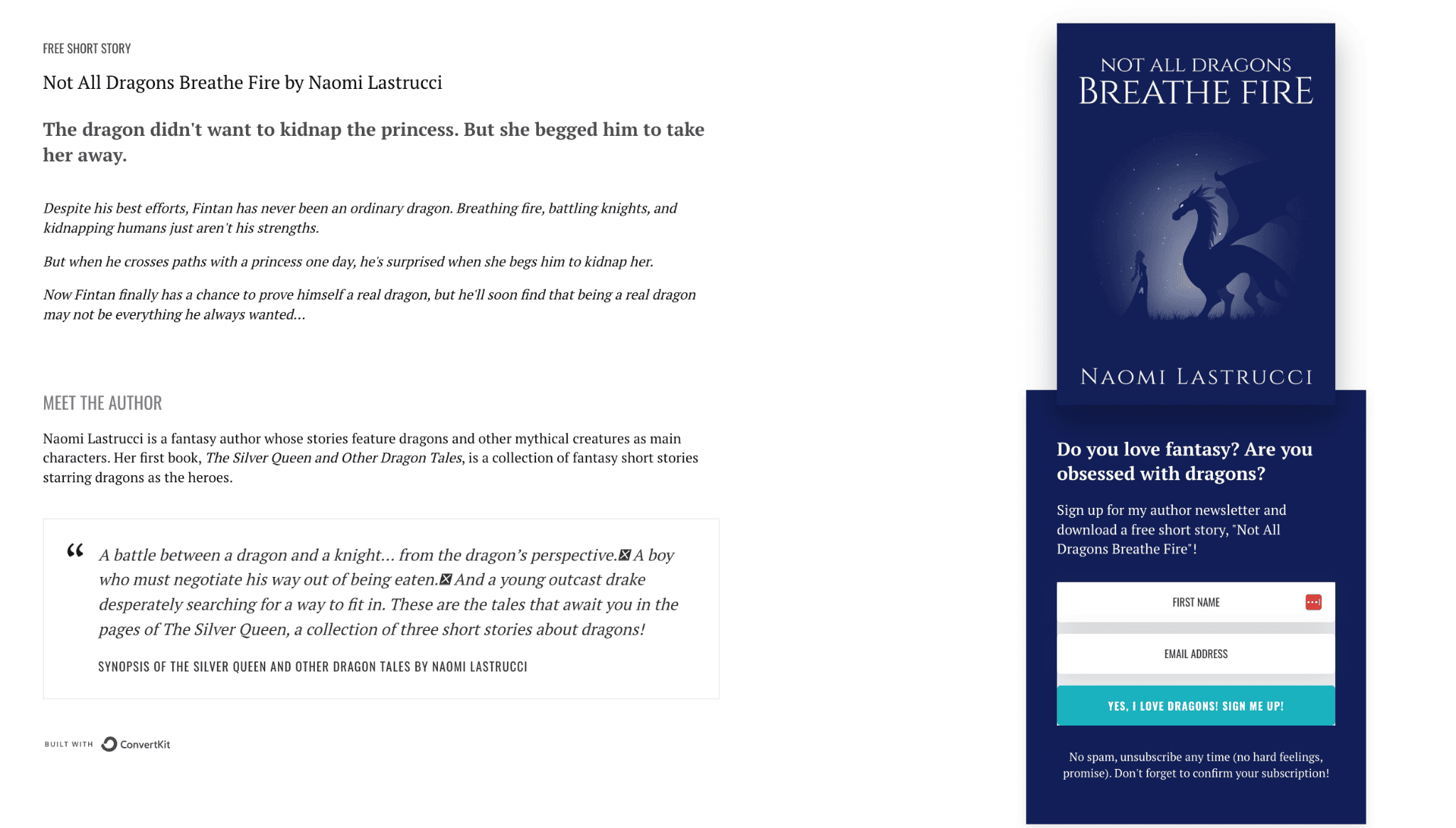
ConvertKit example: Naomi Lastrucci
ConvertKit isn’t your run-of-the-mill website builder for authors. It’s an email marketing tool-turned-content creator platform.
ConvertKit works well for both authors with and without a website. For instance, stoic philosophy advocates Ryan Holiday and Ed Latimore use WordPress for their main website, but rely on ConvertKit for individual campaigns:
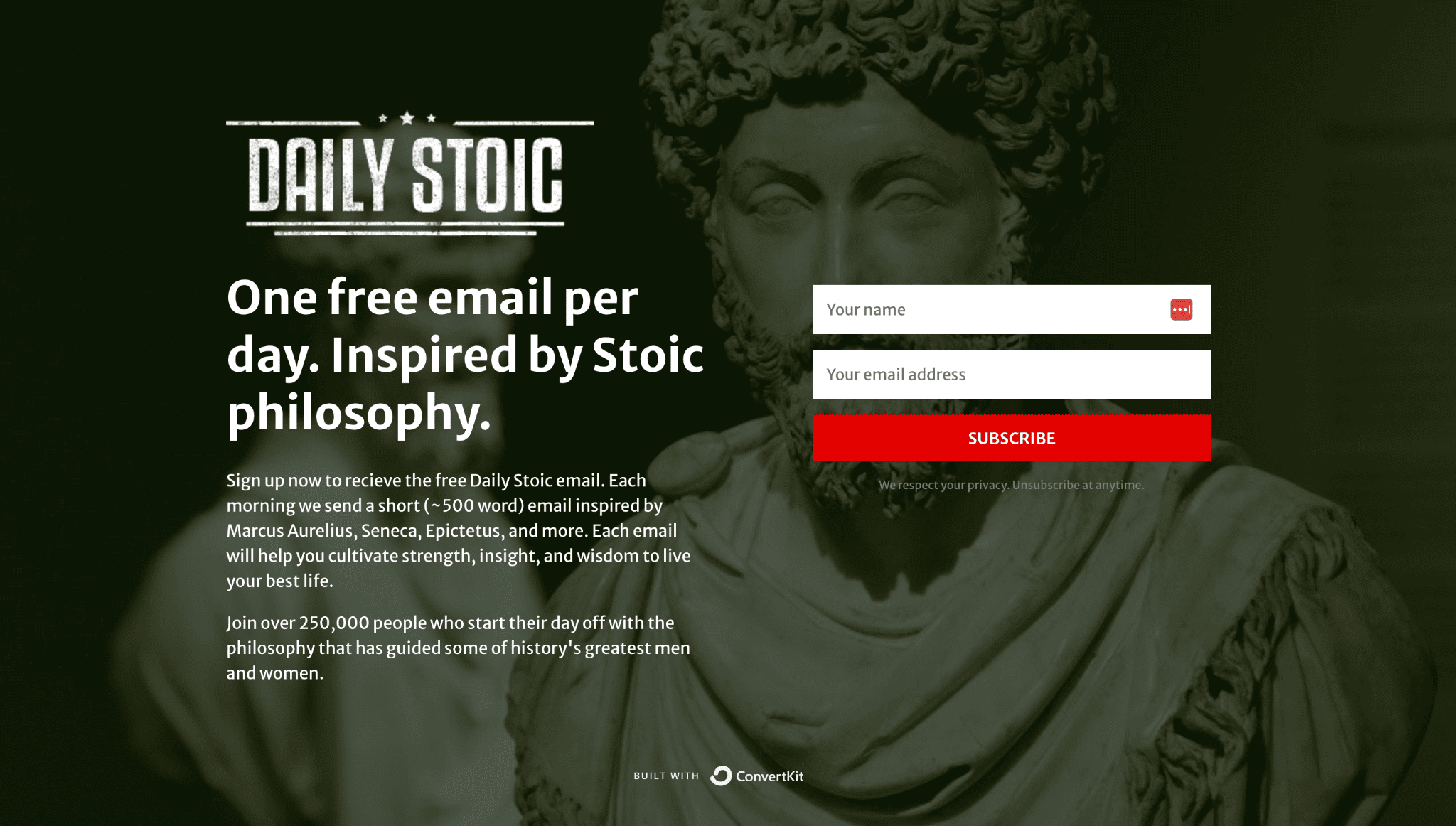
Ryan Holiday’s newsletter sign up page
The platform helps authors create one-page websites (with a custom domain) and forms suitable for lead generation and revenue growth. These usually mean newsletter sign-ups or marketing pages for their books. Free landing page templates are available to get you started:
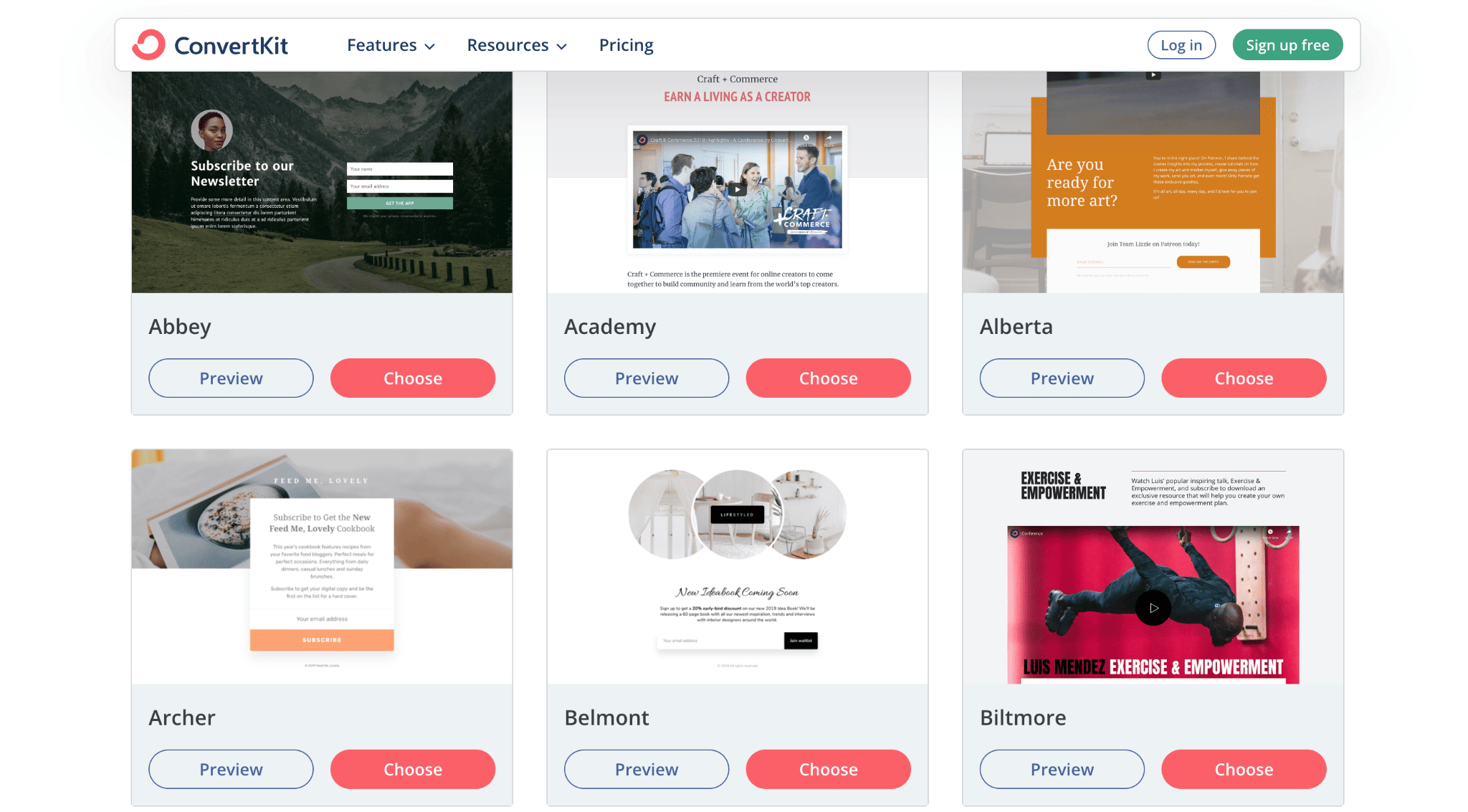
ConvertKit has a wide selection of stylish landing page templates.
Throughout the whole process, ConvertKit leverages its email marketing expertise. Here’s what we know for sure: Our tests consistently demonstrate the platform’s good deliverability rates. With it, you can be closer to your reading audience by managing email marketing campaigns, mailing lists, and digital product sales. It’s also effective at monetizing newsletters through a nifty tip jar – pretty cool for independent artists.
All plans, including the free version, enable users to create unlimited landing pages, link pages, and email opt-in forms. But by upgrading to a premium subscription, you can benefit more from the platform’s functionality. Among the paid features are integrations, visual automation builders, and email sequence automation.
Pros
- Generous free plan
- Strong email marketing capabilities
- Landing pages come with custom domains
Cons
- One-page websites and landing pages only
- No blogging functionality means you’ll still need a website builder for the job
- Landing page templates are free, but are limited
- Costly pricing once you grow your following
ConvertKit’s Pricing Plan
- Free plan available
- Creator: $9/month
- Creator Pro: $25/month
These annual subscription rates apply to creators with less than 300 subscribers. The more subscribers you have, the higher your expenses. The Creator Plan, for example, costs a whopping $2,166/month for creators with 400,000 subscribers, so keep scalability in mind when making your decision.
Best suited for: Content creators-turned-authors, authors who have an active audience, and/or newbie authors who are trying to build a following. ConvertKit is effective at generating leads and keeping them hooked.
More information on ConvertKit
Read our full ConvertKit review on our sister website.
Or try ConvertKit’s free plan today.
Weebly

Weebly’s author website example: Li Yun Alvarado
Weebly is known for its ease of use, which can draw in authors with zero coding skills. While the template selection is pretty sparse, the templates look nice and take little time to customize–especially since Weebly’s editor is the user-friendliest of the bunch.
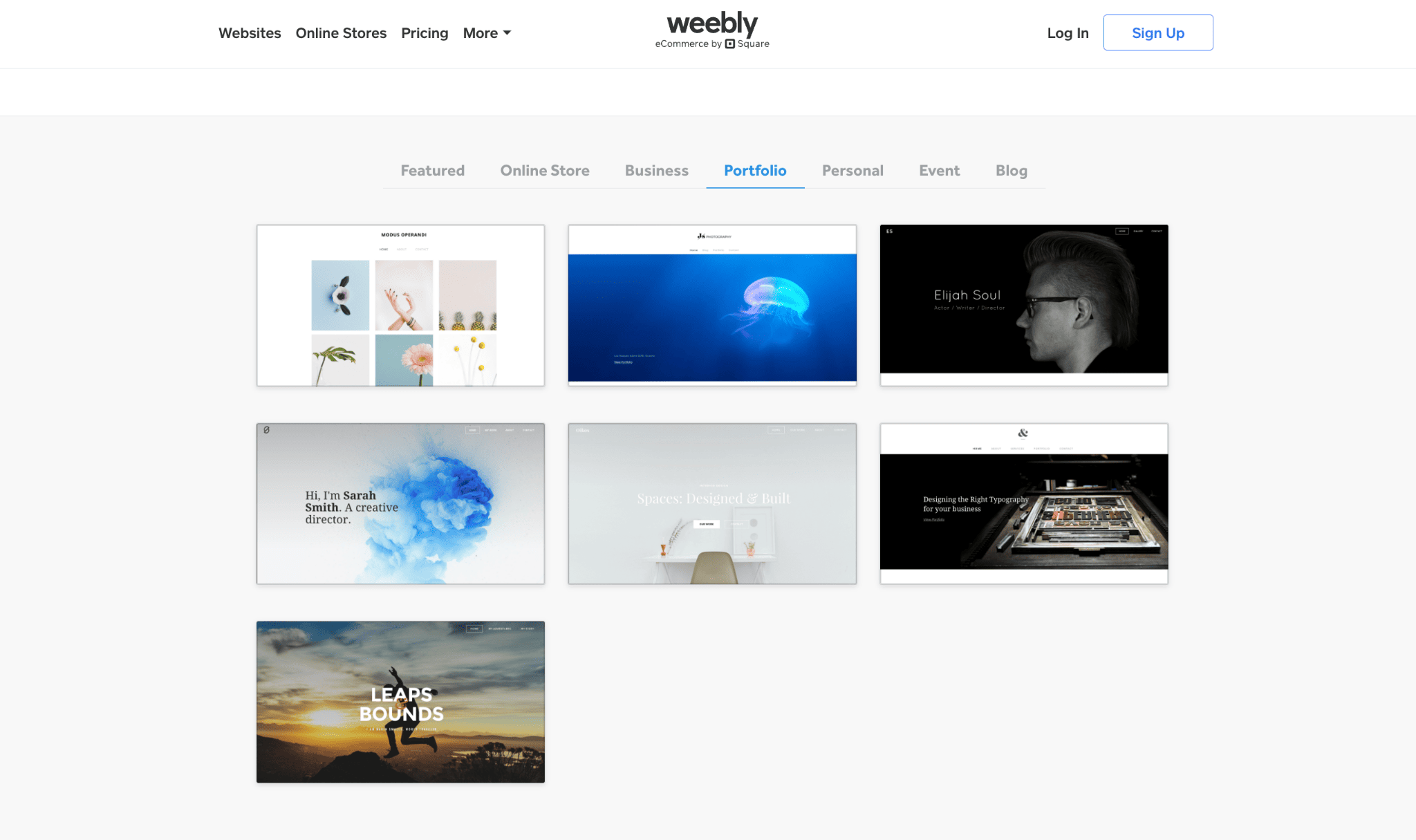
Under Portfolio, there are 7 stylish Weebly themes for authors to choose from.
With the editor’s grid-lock system, elements easily fall neatly into place, preventing overlaps. Of course, this gets in the way of personalization. But if your goal is to simplify the design process and just have a quick way of displaying information about you and your work, it’s an acceptable trade-off.
Weebly has powerful blogging and SEO functionality. Blogging tools include blog-specific themes, built-in RSS and social sharing features, media integrations, and advanced comments management. Like Squarespace, it has a Members Area for registered users, but this doesn’t work for paid content.
In terms of SEO, you can customize title tags, meta descriptions, headers, footers, and URLs.
Another one of its strengths is its Square-powered ecommerce platform that features online store templates, inventory management, fully integrated shopping cart, and secure checkout. Even its free version allows you to take advantage of its selling capabilities.
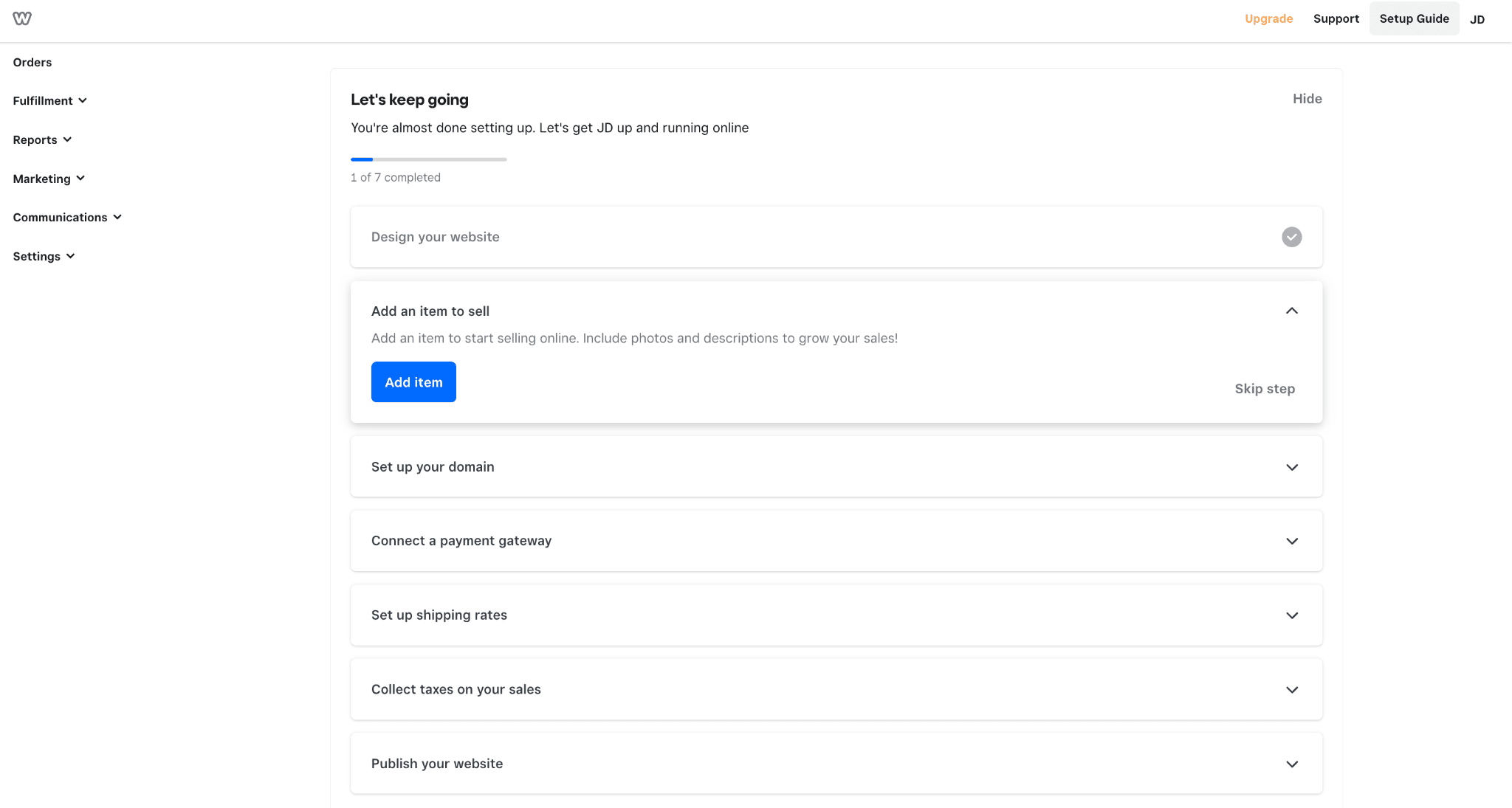
For those who need more functionality, Weebly has over 300 apps to satisfy your needs. Overall, the platform has great qualities that make it the best website builder for authors with basic requirements, but we’re not fond of its slow product rollouts and updates.
Pros
- Strong blogging capabilities
- Selling functionality is accessible on the free plan
- Affordable pricing plans
- Decent app store
- User-friendly editor
Cons
- It lacks functionality (other than its blogging and ecommerce features)
- Slow updates and product roll-outs
- Basic templates with limited customization
Weebly’s Annual Pricing Plans:
- Free version is available
- Personal: 5€/month
- Professional: 12€/month
- Performance: 30€/month
Find out what each plan offers by reading our Weebly’s plan comparison.
Best suited for: Writers who want to focus on writing and selling. If you’re not eager to have a super unique website, Weebly’s basic designs won’t be an issue.
More information on Weebly
Know more about Weebly before signing up.
Or build your author website for free with Weebly today.
Ghost
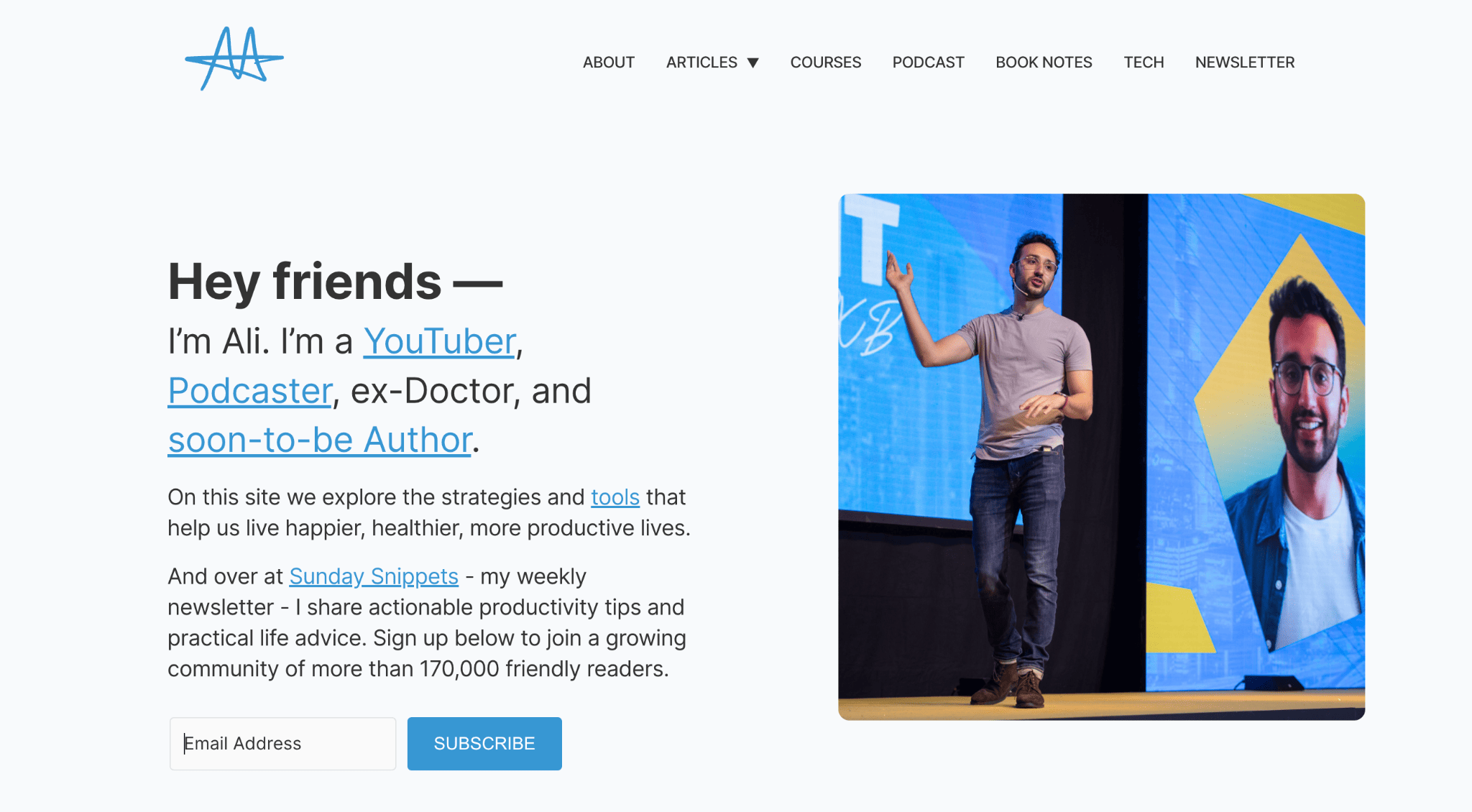
Ghost example: Ali Abdaal
If you’ve heard of Medium – and I am sure you have, as a writer – you’ll like Ghost. Ghost has dubbed itself a “platform for independent publishers”.
But it does more than publish articles. It also enables you to put out premium content, send newsletters, manage subscribers, accept payments, and more. At the same time, you own your content and data, not the platform.
Most of Ghost’s customers are online magazines or news outlets, such as The Lever and Quilette. But content creators-turned-budding authors, such as Ali Abdaal, are leveraging it to strengthen their online presence with ease.
Its main advantage is its powerful blog editing tool that makes the writing experience a simple process. The benefits of this are obvious to writers. It’s one stumbling block removed from the way.
Unfortunately, we can’t say the same for the website editor. Setup requires knowledge of server management and coding. But you can work with Ghost’s team to get around it–it comes with a fee, though.
Ghost’s free and paid templates are gorgeous and tailored to the needs of content-driven websites (which any writer would give an enthusiastic thumbs up to):
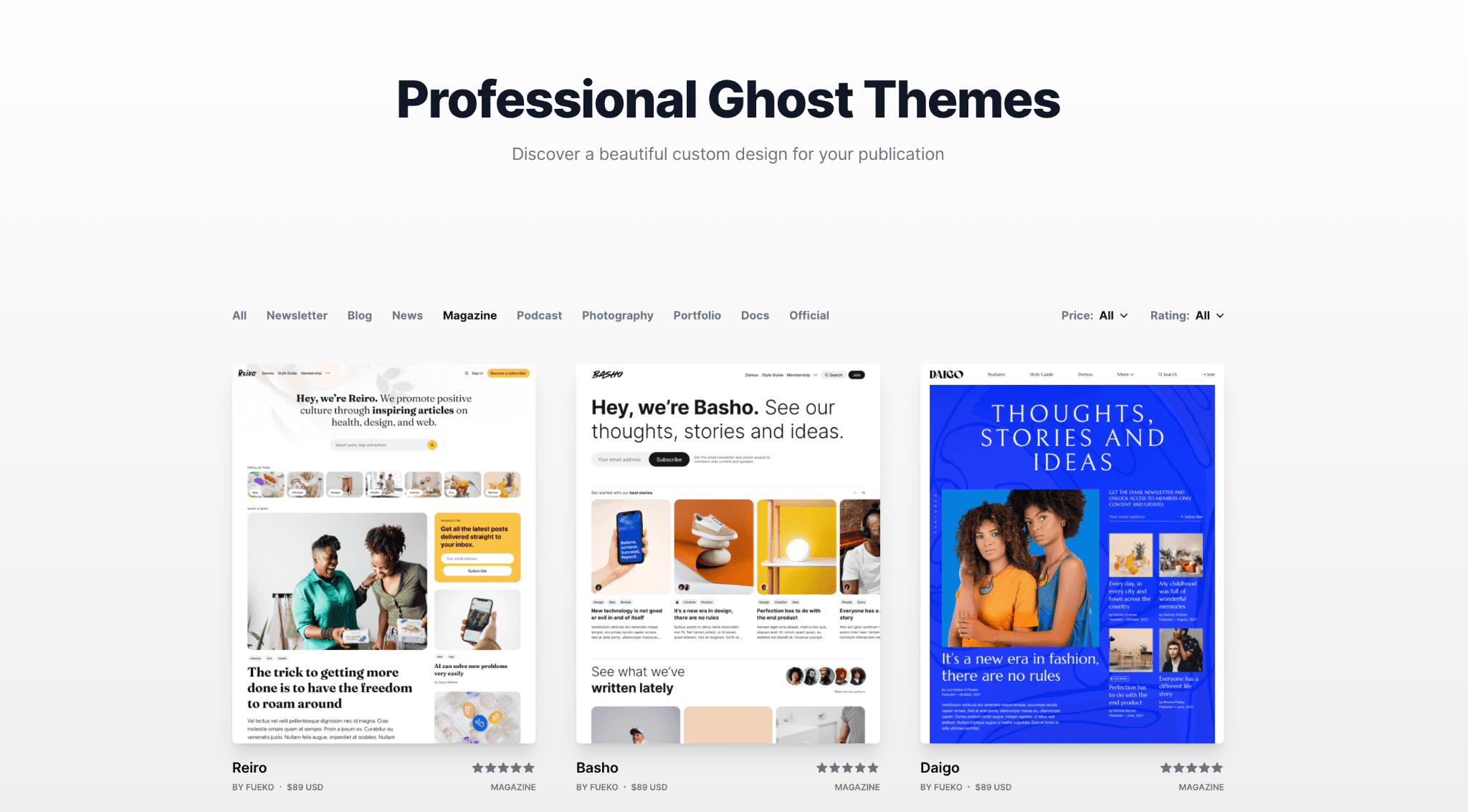
And the platform supports over 1,000 integrations. Authors can use their favorite third-party tools to boost their website’s SEO, social media marketing, email marketing, content creation, community management, ecommerce capabilities, and more.
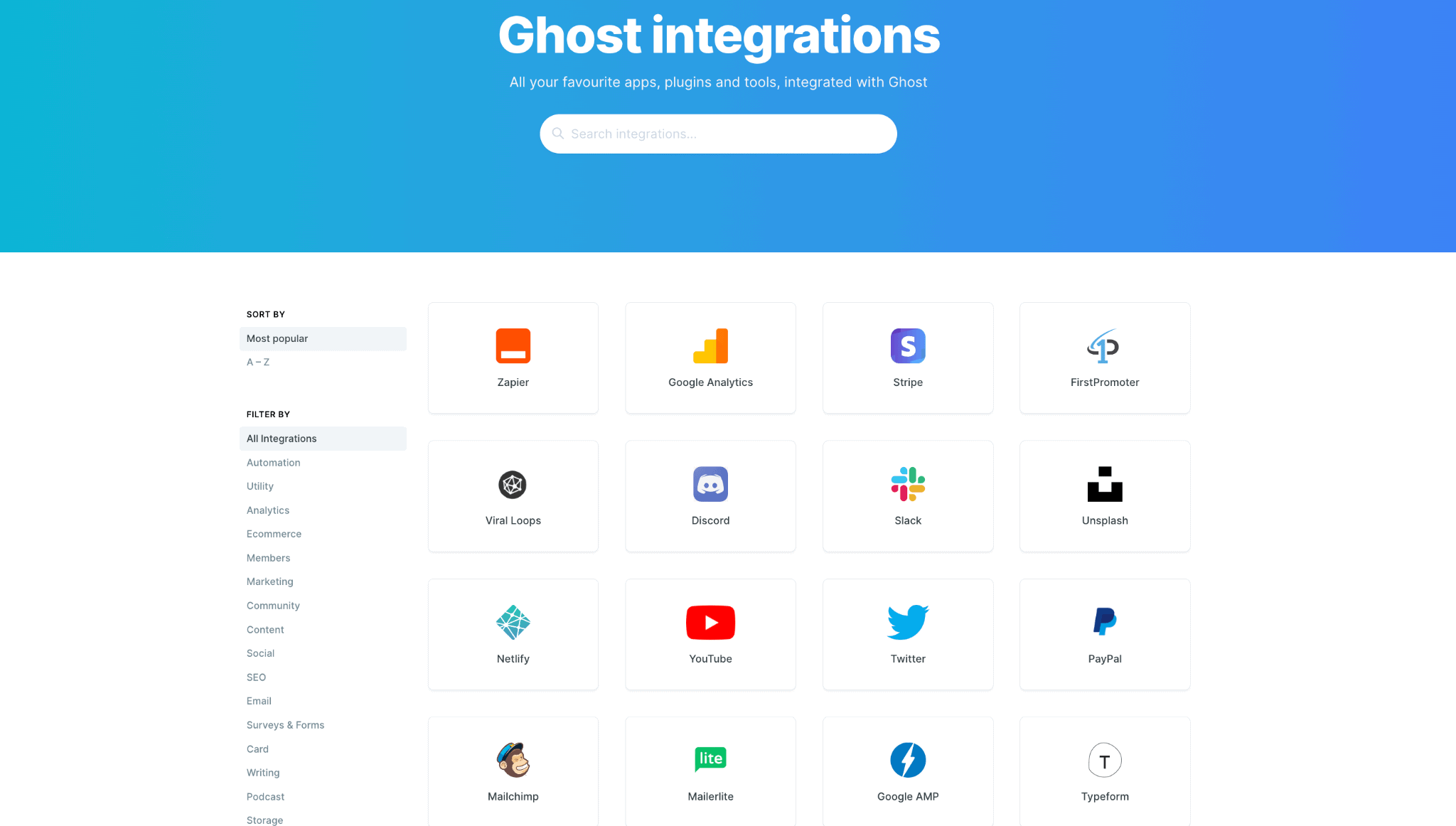
Pros
- Content monetization features for writers
- Content ownership and control
- Easy-to-manage blog editing tool
Cons
- Expensive plans
- Limited website templates
- Setup requires coding expertise
Ghost’s Pricing Plan:
- Starter: $9/month
- Creator: $25/month
- Team: $50/month
- Business: $199/month
Best suited for: Independent/Self-publishing writers or established authors seeking a wider audience.
More information on Ghost
Read about Ghost and other blogging website builders here.
Shopify
Now, Shopify might come off as an unexpected pick for authors, but hear us out. The blend of e-commerce prowess and customizable style makes it a great choice for independent authors.
With a template collection that rivals many (and the option to also purchase additional or custom themes), Shopify ensures you’re not short on design choices. A great place to start is by browsing its “Books, Music and Video” selections, where each theme can help you tell your own tale.

One of the book-themed designs available to purchase in the Shopify Theme Store
Of course, what sets Shopify apart is its e-commerce functionality. Authors can sell physical copies, e-books, and even related merchandise. Plus, integrations with self-publishing platforms like Lulu xPress, IngramSpark, Amazon’s Print-on-Demand (POD), and more can help take care of the logistical side of things.
While Shopify isn’t a dedicated marketing platform, its SEO capabilities can help you reach a wider audience. Add to that an array of email tools and some useful social media integrations, and you have a platform that offers multiple ways for you to connect with your readers. There’s even a built-in blogging feature for sharing snippets, teasers, or musings – a perfect companion to your published work.
And if you’re worried that a Shopify website might be limited in functionality, you’ll be glad to know Shopify’s App Store offers a whopping 8,000+ third-party integrations, from sales aids to marketing enhancements.
Pros
- Comprehensive e-commerce capabilities for selling both digital and physical products
- Customizable themes
- Integrated blogging platform
- Robust SEO tools to help improve site discoverability and reach a wider audience
- Huge range of integrations (e.g. with print-on-demand and self-publishing platforms)
Cons
- Less intuitive, especially for authors after a simple portfolio site, due to its e-commerce-centric design
- Limited built-in blogging features compared to platforms like WordPress or Squarespace
- Customization may require some coding skills
- Extra effort needed for content-based SEO, as the platform is geared more towards e-commerce SEO
Shopify Annual Pricing Plans:
- Basic: 24€ / month
- Shopify: 105€ / month
- Advanced: 384€ / month
Best suited for: Shopify’s wide range of features can cater to diverse authorial needs, but the platform’s cost and complexity make it most beneficial for those who have a clear business strategy and a diverse product offering beyond just a single book.
Learn more in our Shopify review.
How to choose the right website builder for your author website
Finding the best website builder for authors is crucial but can be overwhelming. Whether you’re choosing templates, reviewing third-party plugins, or comparing e-commerce capabilities, these tips can help:
Identify your goals
Author websites are your public profiles, so make them accessible, appealing, and easy to use for current and potential readers. Most website builders have preset single-page or unlimited-page templates. You can use them to integrate web elements like reader reviews, quotes, author bios, contact forms, and book club kits.
To expand your readership or retain existing readers, consider what benefits your author site can provide. Having a blog and a newsletter sign-up form will keep them coming back. These tools help you create a unique connection with readers and they usually love to have that with an author they admire. It also helps if you choose a platform with excellent SEO tools.
But if you’re only looking to create a landing page, a full-blown website builder becomes a discretionary expense. Website builders, such as ConvertKit can lend a hand, regardless of whether you already have an existing website.
You may want interested readers to shop for books or other products directly from your website. A site builder with e-commerce functionality and payment integrations will help you set up a storefront and manage your sales with ease.
Review the technical details
Coding, design, hosting — most authors don’t have any interest or time to learn these technical aspects of website building. That’s why an all-in-one web builder offering all these features can greatly help. It handles the technical process, allowing you to focus on your core work.
Here are three basic features to look for in the best website builders:
- A reliable design platform. A beginner-friendly website builder has a drag-and-drop editor. Think of it as a simple hack to maintain a stunning website with minimal effort.
- Web hosting. Builders with free hosting often include automatic updates, backups, and security measures to protect your website. It’s easier to manage than a self-hosted platform like WordPress, where you must handle everything.
- Support. Choose website builders with multi-channel customer support and a comprehensive knowledge base. Having resources and a helpful team at your disposal will be useful when you hit a snag while DIY-ing your website.
Check for marketing features
Social media and email marketing tools can bolster your online presence and help you build a loyal readership. Wix and Squarespace, for instance, have seamless email management, while ConvertKit’s main focus is email marketing.
The platforms’ built-in tools can segment email lists and automate campaigns without requiring you to switch to third-party applications.
Look for robust analytics and reporting
The best website builder should help you understand your readers and boost your site’s overall performance. Insight visibility and understanding can be the difference between success and failure for helping your business grow – especially if you’re an independent writer.
Having a builder that helps you study your website traffic through Google Analytics is a basic requirement. Third-party data integrations can also enhance campaign performance even if the activities don’t take place directly on your website. Website builders, such as WordPress, Wix, and Ghost, are the top three website builders for authors needing vast app libraries.
Get input from other authors
What better way to find the best website builder for authors than to consult your fellow authors? Look up other author websites and list your favorites. You can use web builder identifiers like BuiltWith and Wappalyzer to identify the platform used to create those websites.
Or, if you’re feeling bold, reach out to them personally and ask them what they think. (Added bonus: It’s an excellent way to expand a writer’s network.) You can find them in various places, such as Facebook groups, Reddit (e.g., r/writers), and other online forums.
Over to you: Which do you think is the best website builder for authors?
If you already have an author’s website, let us know which one works best for you and why!
The 8 platforms listed above are what we consider the best website builders for authors. However, not all of them may be suitable for your particular needs. Follow our tips and weigh your options.
You don’t have to commit right now. But it’s best to take some sort of action and don’t let the feeling of resistance (what Steven Pressfield calls the enemy of creativity) take over.
Read our reviews or sign up for a free account, free trial, or free play today.
We keep our content up to date
20 Sep 2023 - Added Shopify
15 Sep 2023 - Updated features for Wix, Squarespace and WordPress
30 Aug 2023 - Wix pricing and other updates
THE BEHIND THE SCENES OF THIS BLOG
This article has been written and researched following a precise methodology.
Our methodology


